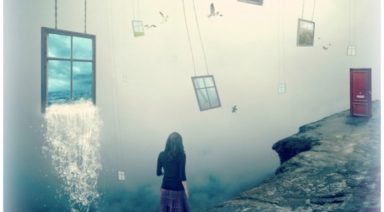Robert Moss Describes Parallel Realities He’s Accessed in Dreams

There is far more to existence than we realize. We spend our day-to-day lives focused on the most immediate concerns of family, work, chores, and entertainment. However, for those adventurous enough to consider other realities, the potential for experiencing parallel realities is fascinating and rewarding.
In a recent interview with Regina Meredith and bestselling author Robert Moss, gives an eye-opening description of life beyond the five senses that turns conventional thought about the boundaries of existence upside-down.
“I’ve long been fascinated by dream experiences of parallel lives,” Robert Moss wrote. “These can take many forms. We find ourselves in the situation of a person living in a different time. We seem to be enjoying — or not enjoying — a continuous life in another reality. We slip into the perspective and apparently the bodies of other people (including even members of other species) who may be living in our present world, but are not ourselves.”
In speaking of his book Mysterious Realities, Robert Moss noted that his personal experiences give evidence for multiple dimensions, not only of time and space but also of the self. In other words, it may very well be that we exist not only here in this world in which we read these very words, but also in dimensions beyond our conscious awareness. Moss characterizes experiences of other dimensions as fun, entertaining, and illuminating.
Dreaming is one way to explore, firsthand, one of the many possible alternate worlds, says Moss. If you monitor your dreams and write them down, he says, over time you will remember instances of when you’re not in your present life. Sometimes we understand there are parallel gifts of creativity, for example, or that we have a chance to change our plans or decisions to make things come out differently.
The imaginal realm implies reams of reality created by imagination over the millennia that we may all share in our travels. Everything that exists does so due to human imagination, including environments that rise up when we die.
Robert Moss writes that in his dreams he has quite frequently found himself living in a city or a country where he used to live, doing the things he may have been doing if he had remained in a former line of work and a certain life situation.
“In these dreams,” he suggests, “I am my current age, but my life has followed a different track from the one I have taken in my waking reality. Sometimes it seems I have joined a parallel self who has been following a path I abandoned – through my life choices.
A fascinating figure, Robert Moss has a way of challenging our sense of existence and the idea of a simple or linear lifetime. His interview with Gaia’s Regina Meredith is both fun and intriguing for anyone who has, at least, had inklings of familiarity with worlds or situations suggesting alternative life choices and memories.
The more we focus on symbols, experiences, and dreamscapes, the more in tune we may become with other “selves” beyond this fairly restrictive life situation that too many believe is the end-all of existence. Moss writes, “When we contemplate what we remember from dreams, we often think about how the dream relates to “real life,” a misnomer for ordinary reality. It is refreshing to reverse the process and ask how ordinary life relates to the real lives we are leading in dreams.”
As you fall asleep at night, you can choose to remain aware of your surroundings and who you are in your dreams. By staying alert you can take advantage of realms involving a sort-of collective unconscious of shared imaginings. Robert Moss is a guide to the inner planes, and his interview with Regina Meredith is one for the adventurer in all of us.
These Near-Death Experiences Describe Direct Experiences With God

What do near-death experiences suggest about the ultimate source of reality, spirituality, and what many call “God?” Psychiatrist Raymond Moody explains the answer to this question in his latest book “God Is Bigger Than the Bible.”
Dr. Raymond Moody has spent more than four decades studying the afterlife. In his 1975 book “Life After Life” he first presented his research on the “near-death experience” or NDE, the transcendent experience of death that radically transforms the life of the person who lives to tell about it. In his new book, Dr. Moody presents his thoughts on God, drawn from the accounts of the thousands of people he has interviewed about their near-death experiences.
“You know, when I was a kid I didn’t think about God. I can’t say I was an atheist because I never really thought about God,” Dr. Moody said. “Then I went to college and got interested in these near-death experiences through Plato, and subsequently have heard of thousands of these from people all over the world who have this same kind of experience—many of them have conversations with God. So that is how I came to God, you know God has become just a big part of my life in the last few decades.”
Dr. Moody’s motivation for writing his latest book is to provide readers with an understanding of God, or source, that is entirely outside the realm of organized religion. To Dr. Moody, idealized religion can present a fearsome image of God that has scared many away from developing a personal relationship with the divine.
“Well, before I started hearing of people with near-death experiences, my notion of God was that people had this imaginary figure who was watching their every step with a little book, trying to see if they’re going to stumble or something,” Dr. Moody said. “But when I started hearing these people with near-death experiences it was a whole different take on God. People say that when they had their cardiac arrest or whatever, that they left their bodies and dissolved into this light, almost. People say that whatever kind of love that you have experienced while you’re alive, that is just beyond description. You go through a passageway to this light of complete comfort, peace, and love, you feel sort of wrapped up in it.”
A common component of the NDE is what is known as the “life review.”
“People say they’re surrounded by a holographic panorama consisting of everything they’ve ever done, and they witness it from the point of view of the other people they’ve interacted with. And all of this is being experienced in the presence of a being of complete compassion and love, who sees all those things they’ve done there, but there’s no judgment coming from this—that this being is helping you evaluate these things. They say that there are no words but that the thought comes through. The question that comes from this being is ‘how have you learned to love?’ People learn a lot about themselves from these encounters with God,” Dr. Moody said.
Through his research, both with near-death experiencers and the elderly, Dr. Moody has come to an understanding of God as the writer of our life stories.




































